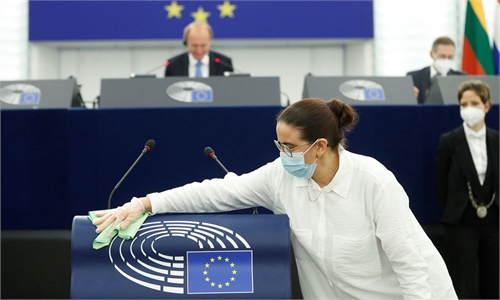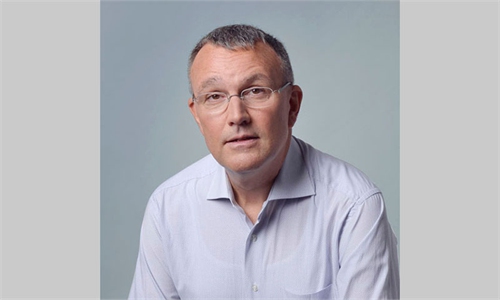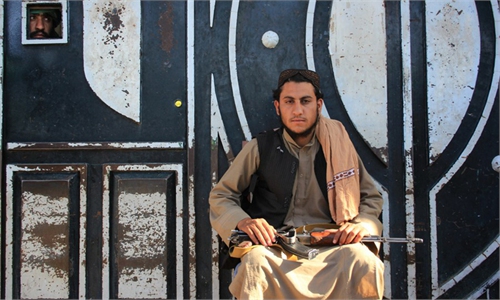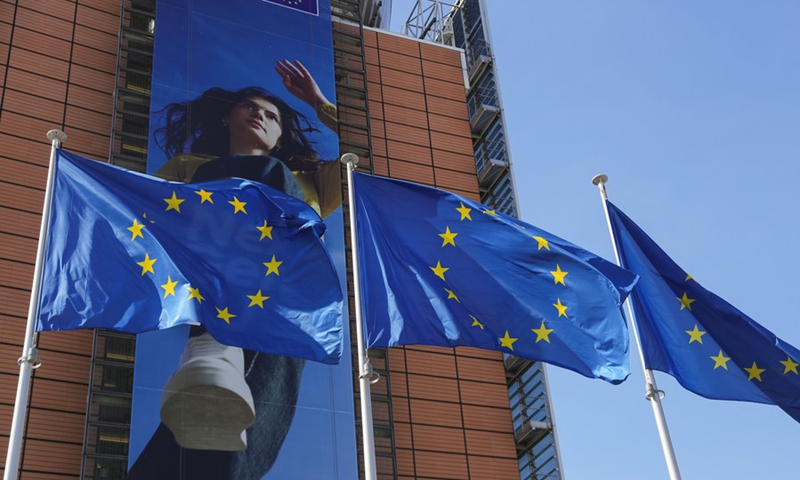
European Union flags fly outside the European Commission building in Brussels, Belgium, on June 9, 2021. Photo: Xinhua
Editor's Note:
"[The] Illegal US/NATO intervention was never about helping Afghani citizens, but enriching military industrial complex." This was recently tweeted by Clare Daly (Daly), an Irish politician and incumbent member of the European Parliament (MEP). Why did she say this? With the 20th anniversary of the 9/11 terror attacks just around the corner, is the threat of terrorism still acute today? Global Times (GT) reporter Li Qingqing talked to Daly about the issues.
GT: The US withdrew its last forces from Afghanistan on August 31. What is your view on the US' 20-year war in Afghanistan? What does the debacle mean to the European allies that have followed the US?
Daly: By its own stated aims the occupation was a failure. Twenty years of supposed state-building might as well not have happened. The truth is that the occupation of Afghanistan was a lucrative industry for a lot of American and European companies. Enormous amounts of public funds from American and European taxpayers were flushed through Afghanistan into the pockets of the arms industry, security contractors, state-owned non-government organizations, and corrupted Afghan elite. Afghan civilians bore the brunt of this occupation and the brutal counterinsurgency which killed hundreds of thousands directly, and many more in its secondary effects. While the US under Biden has dramatically left the myths of the Afghanistan War behind, its European allies are persisting in the delusion that the mission in Afghanistan was about state-building.
GT: When launching the war in Afghanistan, the leaders in the US and the UK were George W. Bush and Tony Blair. The 20-year war in Afghanistan has brought disasters to local people. Who should be responsible for this humanitarian catastrophe? How to hold them accountable?
Daly: Tony Blair and George Bush certainly get a lot of the blame for the morass they created in Afghanistan, but it doesn't stop with them. It would have been impossible for them to do it without the collusion of other states. Leaders in Canada, Australia, and other European states happily lent their support to the ISAF (International Security Assistance Force) mission, and to the state-building project that ensued. This gave it some legitimacy it should never have had, especially among Western public. My own country, Ireland, which is supposed to be neutral and a non-NATO member, participated in the occupation by sending Irish soldiers to Afghanistan on training missions, as part of NATO's so-called "Partnership for Peace." Ireland also allowed the use of its civilian airport by the Pentagon for US troop and munitions transits. It would be nice if leaders could be held accountable for this, but even more important is learning the lessons and making sure it never happens again.
GT: It will soon be the 20th anniversary of the 9/11 terror attacks. After the 20-year war against terrorism, how do you evaluate the threat of terrorism today? Is the so-called conflict between Christianity and Islam inevitable?
Daly: I don't believe there is a conflict between Christianity and Islam. The majority of people in these religions are peaceful, ordinary, working people. It is politics that fuels wars and terrorism, not theology. The "war on terror" was not really about fighting terrorism either. What was required was a policing operation, not a 20-year military occupation. The Bush administration instead used the 9/11 attacks to justify pursuing its foreign policy agenda. The US military industrial complex also inflated the threat of terrorism to replace the USSR as its official "enemy" - which helped ensure the lavish defense spending it is accustomed to. The "war on terror" destroyed countries, creating breeding grounds for groups like ISIS, increasing terrorism rather than reducing it. Nothing about this was inevitable, and we should remember that when European and American elites try to launch their next war.
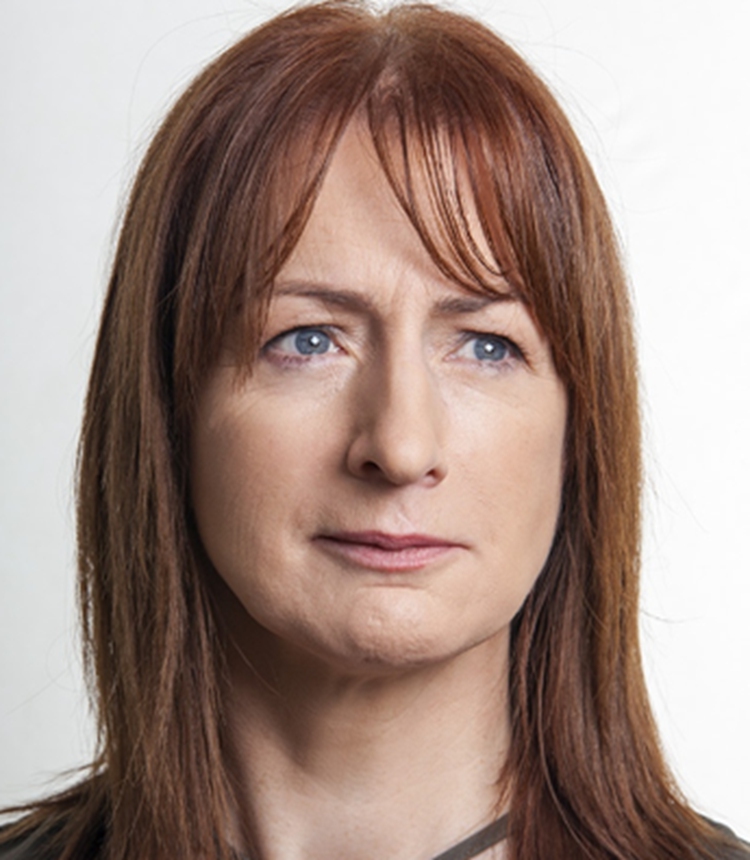
Clare Daly. Photo: Courtesy of Clare Daly
GT: The Afghan Taliban has said it sees China as a friend and is hoping to talk to Beijing about investing in reconstruction work. This has aroused the world's attention. The US has resorted to force to change other countries, which is in sharp contrast with China's win-win cooperation diplomacy. How do you view China's principle of treating other countries equally and non-interfering in other countries' internal affairs?
Daly: The principle of non-interference in other countries' internal affairs and the principle of sovereign equality among nations are both fundamental principles in international law. When it adheres to these principles, China is doing no more than respecting and upholding international law, as it should.
GT: The US has always unilaterally promoted its "universal values" and the Western political system. While China, led by the Communist Party of China (CPC), advocates a community with a shared future for mankind. The CPC opposes using one civilization to replace another. Do you think China's proposal deserve more attention?
Daly: I believe it requires more attention than it is getting, even if just to be better informed. If a Western leader is going to speak about China, they should be literate in the history of China and of the CPC and the different phases of its ideological development. They should understand the economic development of China, and they should at least know how its political system works. None of this happens. Debates about China in European politics take place from a position of almost complete ignorance about China. European leaders talk about a confrontation between "democracy" and "authoritarianism." They are extremely poorly educated in political philosophy and unable to understand the ideological stakes of the present moment. How can you criticize China if you have never even read a book about it? It is farcical.
GT: The war in Afghanistan has also cast a shadow on Western humanitarianism. As far as you know, what reflections and corrections have been made (or will be made) within Europe about the 20-year war against terrorism?
Daly: I don't expect any reflection from the European establishment over this, and I don't expect them to make any corrections. We have already had an announcement from the Vice President/High Representative for Foreign Affairs Josep Borrell that what has happened in Afghanistan should serve as the impetus for the creation of an EU army. Instead of learning the lessons they should learn from Afghanistan they are only going to double their resolve. Not only is that bad for the world, it should be deeply worrying to any voter in Europe who expects their political leadership to act in a rational way.
